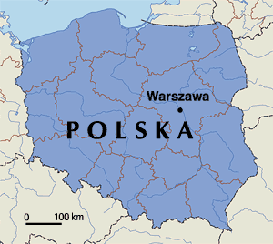
“I spent the first three months of this year sitting in REC, a software engineering company in Wroclaw, Poland doing  the job of a Software Engineer. So what is unusual about that? I am a Senior Lecturer in Software Engineering and have, for the first time in my career, had complete immersion in a company doing the subject I research, talk to students about, enthuse with colleagues about and generally bore my outside friends about. As part of the INFER project headed up by Bogdan Gabrys which is creating a complex, predictive, adaptive system, I have had an opportunity that rarely comes an academics way. I got to live in Wroclaw, had fun getting about in a beautiful part of Poland and really enjoyed being among the Polish people. ( I would also recommend the Bison grass Vodka J).
the job of a Software Engineer. So what is unusual about that? I am a Senior Lecturer in Software Engineering and have, for the first time in my career, had complete immersion in a company doing the subject I research, talk to students about, enthuse with colleagues about and generally bore my outside friends about. As part of the INFER project headed up by Bogdan Gabrys which is creating a complex, predictive, adaptive system, I have had an opportunity that rarely comes an academics way. I got to live in Wroclaw, had fun getting about in a beautiful part of Poland and really enjoyed being among the Polish people. ( I would also recommend the Bison grass Vodka J).
As a result I have already written a conference paper and had it accepted whilst a journal paper will follow. I will have two very useful case studies which I can discuss with colleagues and have learnt a great deal about the processes involved in the company (my particular research interest). I am advising the company on the ways that they can improve what they are doing – so it is a two way thing. Finally, as a result of the project my network  has expanded considerably with both academics and industrialists. I can see how I may need change my teaching strategy to respond to what is happening in the real world and I am well placed to consider applying for funding with my company colleagues in the future to continue the work I have started.
has expanded considerably with both academics and industrialists. I can see how I may need change my teaching strategy to respond to what is happening in the real world and I am well placed to consider applying for funding with my company colleagues in the future to continue the work I have started.
At a recent meeting discussing our strategy for BU’s engagement with Europe, I was surprised to hear that many academics were either not interested or were nervous of starting out in the EU. I agreed to write about my current journey. If you work at BU and want to find out more, let me know. I am happy to help.”















 We are delighted to offer a bespoke GrantCraft Research Workshop Day on May 11th 2011, facilitated by Dr Martin Pickard, a specialist in writing and supporting research proposals (particularly EU). Sessions will be held on grant writing skills, impact and benefit, how to write a Marie Curie proposal and the management of EU projects. You can attend as many sessions as you like throughout the day. To read more on each session and to make a booking see our
We are delighted to offer a bespoke GrantCraft Research Workshop Day on May 11th 2011, facilitated by Dr Martin Pickard, a specialist in writing and supporting research proposals (particularly EU). Sessions will be held on grant writing skills, impact and benefit, how to write a Marie Curie proposal and the management of EU projects. You can attend as many sessions as you like throughout the day. To read more on each session and to make a booking see our 










 New CMWH paper on maternity care
New CMWH paper on maternity care From Sustainable Research to Sustainable Research Lives: Reflections from the SPROUT Network Event
From Sustainable Research to Sustainable Research Lives: Reflections from the SPROUT Network Event REF Code of Practice consultation is open!
REF Code of Practice consultation is open! ECR Funding Open Call: Research Culture & Community Grant – Apply now
ECR Funding Open Call: Research Culture & Community Grant – Apply now ECR Funding Open Call: Research Culture & Community Grant – Application Deadline Friday 12 December
ECR Funding Open Call: Research Culture & Community Grant – Application Deadline Friday 12 December MSCA Postdoctoral Fellowships 2025 Call
MSCA Postdoctoral Fellowships 2025 Call ERC Advanced Grant 2025 Webinar
ERC Advanced Grant 2025 Webinar Update on UKRO services
Update on UKRO services European research project exploring use of ‘virtual twins’ to better manage metabolic associated fatty liver disease
European research project exploring use of ‘virtual twins’ to better manage metabolic associated fatty liver disease